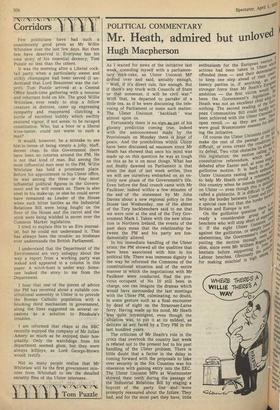Corridors
Few politicians have had such a unanimously good press as Mr Willie Whitelaw over the last few days. But then few have deserved it. Everyone has his own story of his essential decency, Tom Puzzle no less than the others.
It was the morning after a Liberal cocktail party when a particularly sweet and sickly champagne had been served (I understand that Lord Beaumont was the culprit). Tom Puzzle arrived at a Central Office lunch-time gathering with a tenuous and reluctant hold on life. The good Willie Whitelaw, ever ready to stop a fellow creature in distress, came up expressing sympathy and reappeared clutching a bottle of excellent bubbly which swiftly restored vigour, if not sense, to be ravaged constitution. Who, but a boor or a liberal wine-taster, could not warm to such a man?
It would, however, be a mistake to see him in terms of being simply a jolly, bluff, decent chap. In this Government there have been no coteries around the PM. He is not that kind of man. But among the most influential men near to the PM, Willie Whitelaw has held a prominent place. Before his appointment to his Ulster office, he was among the three or four most influential political figures in the Government and he will remain so. There is also steel in his make-up, or else he could never have remained as Leader of the House when such bitter battles as the Industrial Relations Bill were being fought on the floor of the House and the carrot and the stick were being wielded in secret over the Common Market legislation.
I tried to explain this to an Eire journalist, but he could not understand it. That has always been the trouble: no Irishman ever understands the British Parliament.
I understand that the Department of the Environment are very unhappy about the way a report from a working party was leaked and appeared in a column in this paper. A witch-hunt is under way. Someone leaked the story to me from the Department.
I hear that one of the pieces of advice the PM has received about a suitable constitutional assembly in Ulster is to provide the Roman Catholic population with a blocking third mechanism in government, along the lines suggested on several occasions as a solution to Rhodesia's troubles.
I am informed that chaps at the BBC recently enjoyed the company of Mr Julian Amery as much as he enjoyed their hospitality. Only the watchdogs from his department seemed glum, but they were always killjoys, as Lord George-Brown would testify.
Not so many people realise that Mr Whitelaw will be the first government minister from Whitehall to see the detailed security files of the Ulster internees.
r
Tom Puzzle


































 Previous page
Previous page